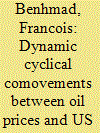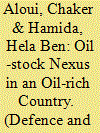| Srl | Item |
| 1 |
ID:
121350


|
|
|
|
|
| Publication |
2013.
|
| Summary/Abstract |
In this paper, we use wavelet analysis to investigate the cyclical comovements between crude oil prices and US GDP, taking into account the decline in the volatility of US GDP growth that has occurred since the mid-1980s.
Our main findings suggest that before 1984:Q1, the crude oil prices were leading the US GDP cycle by 3 quarters and Granger cause US GDP. In contrast, after 1984:Q1, the crude oil prices were lagging the US business cycle, and a reverse causality is found to run from US GDP to oil prices. The multiscale Granger causality tests globally corroborate theses results.
|
|
|
|
|
|
|
|
|
|
|
|
|
|
|
|
| 2 |
ID:
178023


|
|
|
|
|
| Summary/Abstract |
This paper employs a wavelet approach to investigate the relationship between economic growth and military spending in a time-frequency domain for the case of Turkey. Turkey presents an interesting case for analysis of military spending and economic growth, as its geopolitical position and history of insurgencies and separatist violence oblige the country to devote an unusually large share of the central government budget to national defence. Timescale regression analysis reveals that military expenditures have significant negative effects on growth in per capita GDP at business cycles of 16 years and longer. Timescale Granger causality analysis indicates that per capita GDP growth responds to movements in military expenditures at business cycles of eight years and above and that this result is very significant. Wavelet coherency analysis corroborates these findings, indicating a significant negative long-run co-movement at business cycles of 16 years and longer. Thus, the neoclassical prediction that military spending may promote growth does not hold in the case of Turkey, at least in the long run. Furthermore, the analysis reveals that, in the long run, military spending has been leading rather than lagging economic growth.
|
|
|
|
|
|
|
|
|
|
|
|
|
|
|
|
| 3 |
ID:
178629


|
|
|
|
|
| Summary/Abstract |
In this paper, we attempt to delineate the relevance of geopolitical risk in the oil-stock nexus in a time-frequency domain. We resort to various wavelet coherence methods to capture the influence of geopolitical risk on the dynamic association between oil and stock prices in Saudi Arabia as a rich oil-exporting country in a region with high geopolitical risk. We primarily show that the role of geopolitical risk in the oil-stock interplay varies through timescales and investment horizons. News regarding geopolitical tensions affects the stock market in high frequency bands, while oil impacts are manifested more on longer time-horizons. Geopolitical risk weakens oil-stock connectedness in the short term. Interestingly, geopolitical incidents significantly lower the oil-stock magnitude and volatility correlation. These results offer prominent insights for investors and policy makers, which may be beneficial when responding to future geopolitical tensions in terms of risk management and the identification of investment opportunities.
|
|
|
|
|
|
|
|
|
|
|
|
|
|
|
|